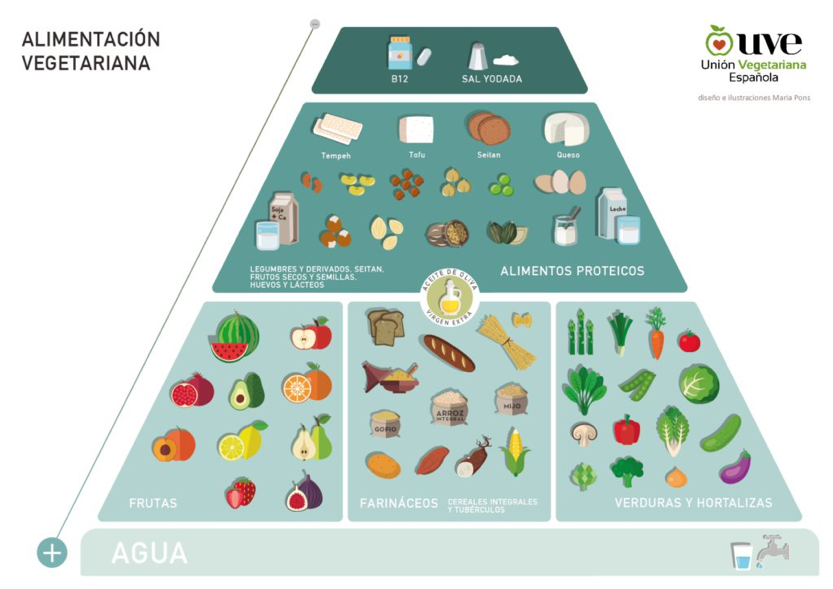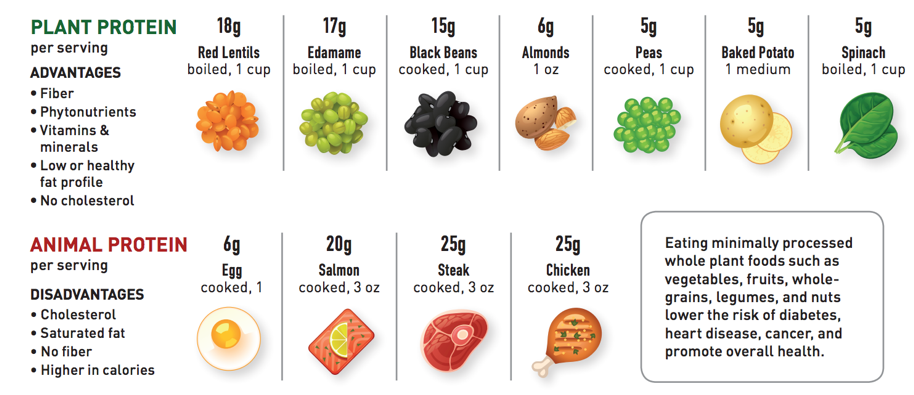In recent decades, interest in vegetarianism has increased. According to a report presented by the International Vegetarian Union (IVU), in 2017 there were more than 600 million vegans in the world.
In Spain, the most reliable and closest information available is provided by the Encuesta Nacional de Ingesta Dietética Española (national survey of dietary intake of Spain). It indicates that the number of vegetarians in our country (approximately 700,000 people) is rising and will continue to do so in the coming years. The reasons that lead to choosing this type of diet are varied: for health, ethical, or ecological reasons, animal rights, religion… They say “we are what we eat”, but should we stop eating animal protein?
Tania Mesa – Director of Neolife Nutrition and Nursing Unit
Alejandro Monzó – Neolife Nutrition and Nursing Unit
The Western diet has been linked to several chronic illnesses
Before answering the above question, we want to explain the differences between a vegetarian diet, veganism, and other variants.
Vegetarianism is, by definition, a type of diet that eliminates all or part of the consumption of foods of animal origin: meat, fish, but also milk, eggs, and honey. There are many varying degrees within this practice, as there are people who don’t eat meat, but consume milk and eggs; others who don’t consume meat or milk, but eat eggs, and so on. This results in different types of vegetarianism:
- Ovo-lacto vegetarianism: don’t eat meat, chicken, and fish, but consume eggs, dairy products, and honey.
- Lacto vegetarianism: don’t eat meat, chicken, fish, and eggs, but consume dairy products and honey.
- Ovo vegetarianism: don’t eat meat, chicken, fish, and dairy products, but consume eggs and honey.
- Vegan: they are considered to be “strict vegetarians”; they do not consume any type of food of animal origin: meat, fish, milk, eggs or honey. No exceptions.
- Raw veganism: a vegan who only eats raw food.
- Api vegetarianism: don’t eat meat, fish, eggs, and milk, but consume honey.
- Granivores: prioritize foods from grains and seeds.
- Frugivorism: only eat fruit.
There are those who choose to become vegetarian and continue to consume certain types of meat. This is called semi-vegetarianism. And so we have:
- Pescatarianism or pescetarianism: don’t consume meat from animals, but do eat fish and seafood.
- Pollo vegetarianism: don’t consume red meat, but do eat poultry.
- Flexitarian: is a flexible vegetarian. At home, this individual does not eat animal products, but if they go to a friend’s or out to a restaurant, they might agree to eat meat. (Some vegetarian associations do not accept these practices as vegetarianism as there is a consumption of meat.)
Balanced plant-based diets that include reduced amounts of animal proteins, such as fish and poultry, can be beneficial in preventing nutritional deficiencies or some chronic diseases. However, very restrictive diets or unbalanced vegetarian diets, such as frugivorism or raw veganism may cause health risks.
The Benefits of a vegetarian diet
In 2016, the latest scientific evidence on vegetarian diets was presented by the Journal of the Academy of Nutrition and Dietetics. Their position is clear and the evidence at the moment shows that adequately planned vegetarian diets (Figure 1.), including veganism, are healthy, nutritionally appropriate, and may provide health benefits in terms of prevention and treatment of certain diseases.
The results of their literature review show that vegetarians and vegans have a lower risk of certain diseases, such as ischemic heart disease, type 2 diabetes, high blood pressure, certain types of cancer, obesity, and chronic illnesses in general (3).

It is worth noting that plant-based diets are more environmentally sustainable, as fewer natural resources are necessary for food production (5). To produce one kilogram of edible protein from legumes, you need about 18 times less soil, 10 times less water, 9 times less fuel, 12 times less fertilizer, and 10 times less pesticides than producing a kilogram of protein from beef. Moreover, producing one kilogram of protein from beef generates 5 to 6 times more waste (manure). Therefore, reducing the consumption of food of animal origin can be a useful tool to fight climate change and improve public health.
On the other hand, a recent study published in the journal Nutrition Reviews shows that animal protein has better biological value than vegetable protein, but in turn contains more fat and cholesterol (6). Protein-rich plant-based foods provide very little fat and a lot of fiber, with all the health benefits that come with it. Additionally, its consumption has been shown to have a reverse effect, with lower body weight, smaller waist circumference (both involved in cardiovascular risk), and lower cholesterol, as well as inflammatory biomarkers in the blood.
In conclusion, a well-planned vegetarian diet, in any of its forms, may be considered perfectly suitable for anyone who wants to adopt one (7). In fact, some of the characteristics of vegetarian diets, such as lower intake of saturated fat and cholesterol, greater quantity of vegetables and fruits, fiber, etc. (Figure 2.), may be considered to be positive factors for the prevention and treatment of chronic illnesses, like diabetes.

The limitations of a vegetarian diet
Although there is a wide consensus on the safety of vegetarian diets, it is necessary to keep in mind a number of considerations, which people are often unaware of and which may affect their health (3,7,9):
- Poorly planned and unsupervised vegetarian diets may pose a health risk, as a result of potential energy and nutrient deficiencies.
- The bioavailability of plant proteins is lower for vegans, so the daily amount of protein is probably slightly higher than that recommended in non-vegetarian diets.
- The intake of omega-3 fatty acids in a strict vegan diet may be insufficient. It is true that omega-3 can be found in plant sources, such as certain microalgae, some nuts, seeds, and soybeans, but, its bioavailability and use on the part of the human body is much lower compared to the consumption of blue fish, extraordinary sources of this fatty acid. We should, therefore, consider adding omega-3 supplements in certain cases.
- In vegan diets, there is less ability to intake iron and zinc from food sources, so the consumption of foods rich in vitamin C is recommended in all meals, to improve their absorption.
- Another recommendation is to consume foods fortified with calcium and vitamin D, combined with the regular practice of physical activity, to get an adequate amount of calcium in the bones. Vitamin D supplements are sometimes necessary. In the case of lacto-vegetarians, ovo-lacto vegetarians or semi-vegans, this need would be covered.
- It is very important to include vitamin B12 supplements in vegan diets, 1 or 2 times a week, because this vitamin is mostly lacking in vegan diets.
- Finally, it’s important to consume iodized salt, as iodine is found only in a few foods, such as dairy products, fish, and seafood.
Pro-vegan movements: a reflection
There has been an increase in plant-based diets in recent decades due in part to the increase of information available in the media, in documentaries, in social media, on the internet…
It’s important to not make the mistake of thinking that “a vegetarian or vegan diet is healthier than an omnivorous diet”. Why’s that?
The first rule of a healthy diet is to eat real food, and this also applies to vegans. Unfortunately, nowadays in the supermarket, in the vegan section, you will find all kinds of meat substitutes, vegan products, sugary vegetable drinks… they’re anything but food. If this type of product represents an important part of your daily diet, it poses a health risk. This is why it is absolutely essential to provide the correct information and encourage nutrition education in the consumer.
Poorly balanced vegetarian diets, as we mentioned above, may present significant energy deficiencies, missing macronutrients (proteins) and micronutrients (vitamin B12 and vitamin D, iron, zinc, calcium, iodine, omega 3), leading to potential negative consequences for health and the optimization of athletic performance, according to a major review published in the prestigious Journal of the International Society of Sports Nutrition (10).
Recently, there have been documentaries (such as What the Health, The Game Changers, among others), pro-vegan advertising, associations and studies with particular interests, which ignore science and base their beliefs on ideology, known as “vegan dogma”.
The studies that present the benefits of these diets have limitations:
- Vegetarian diets are compared with the typical Western diet (i.e. the American diet), high in processed foods, sugars, unhealthy fats (saturated, trans…) and very poor in fiber. Any reasonable diet, such as the Mediterranean diet, used as a point of comparison will come off well.
- In these studies, different population groups are compared. Vegetarian people generally show a greater concern for their health (they smoke less, they do more sport, they consume less alcohol…) compared to control individuals.
This makes it impossible to claim that a vegan diet is better than an omnivorous diet, since, after all, there are numerous health factors involved (rest, lifestyle, toxic habits, stress, environment, etc.) to consider. Moreover, we can’t ignore the existence of studies, which are lesser known, that claim that vegetarian diets don’t lead to a decrease in mortality, and even attribute greater health problems to it (11,12).
Conclusions
Well-planned and properly supplemented vegetarian diets are not harmful to overall health, but some of the benefits of such diets may not only come from eliminating animal products, but from adding more plant sources, such as vegetables, legumes, fruits… as well as the adoption of healthy lifestyles (being physically more active, eliminating toxic habits, less stress…).
Therefore, we cannot say that a vegan or vegetarian diet will be “better or worse” than an omnivorous diet without considering what constitutes a healthy and balanced diet, based on high quality foods and raw materials. Both must be well designed to be able to guarantee health and quality of life.
Therefore, it is important, if you are going to adopt a vegetarian diet, to follow up regularly with your nutritionist, and to make sure there are no deficiencies of any vitamin or any nutrient, which may be harmful.
BIBLIOGRAPHY
(1) (2019). “Tendencias de consumo” [Consumption trends]. International Vegetarian Union. URL: https://ivu.org/history-legacy-pages/world-veganism-past-present-and-future.html
(2) (2017). “Estadísticas: número de vegetarianos en España” [Statistics: number of vegetarians in Spain]. Unión Vegetariana Española. URL: https://unionvegetariana.org/estadisticas-numero-de-vegetarianos-en-espana/
(3) Melina, V. et al. (2016). “Position of the Academy of Nutrition and Dietetics: Vegetarian Diets”. J Acad Nutr Diet. Vol. 116(12): 1970-1980. URL: https://jandonline.org/article/S2212-2672(16)31192-3/fulltext
(4) UVE (2018). “Pirámide de la alimentación vegana” [The vegan food pyramid]. URL: https://unionvegetariana.org/piramide-de-la-alimentacion-vegana/
(5) Sabaté, J. et al. (2015). “The environmental cost of protein food choices”. Public Health Nutr. Vol. 18(11): 2067-73. URL: https://www.ncbi.nlm.nih.gov/pubmed/25374332
(6) Ahnen, R.T. et al. (2019). “Role of plant protein in nutrition, wellness and health”. Nutr Rev. pii: nuz028. URL: https://www.ncbi.nlm.nih.gov/pubmed/31322670
(7) De Luis Román, D.A. et al. (2017). “Dietoterapia, nutrición clínica y metabolismo” [Diet therapy, clinical nutrition, and metabolism]. Third edition. Vegenat, Healthcare. Sociedad Española de Endocrinología y Nutrición (SEEN) and Grupo Aula Médica, S.L.
(8) ACLM (2013). “Plant protein vs. animal protein”. American College of Lifestyle Medicine. URL: https://drhillelharris.com/wp-content/uploads/2019/04/ACLM-PvsA-Protein-FNL.pdf
(9) Vegan Health. (2019). “Evidence-based nutrient recommendations”. A project of vegan outreach. URL: https://veganhealth.org/
(10) Rogerson, D. (2017). “Vegan diets: practical advice for the athletes and exercisers”. J Int Soc Sports Nutr. Vol. 14:36. URL: https://www.ncbi.nlm.nih.gov/pmc/articles/PMC5598028/
(11) Mihrshahi, S. et al. (2017). “Vegetarian diet and all-cause mortality: evidence from a large population -based Australian cohort- the 45 and Up Study”. Preventive Medicine, 97,1-7. URL: https://www.sciencedirect.com/science/article/pii/S0091743516304479?via%3Dihub
(12) Gorlova Y., O. (2014). “Nutrition and health -the association between eating behavior and various health parameters: a matched sample study”. PLoS One. Vol. 9(2): URL: https://www.ncbi.nlm.nih.gov/pmc/articles/PMC3917888/
